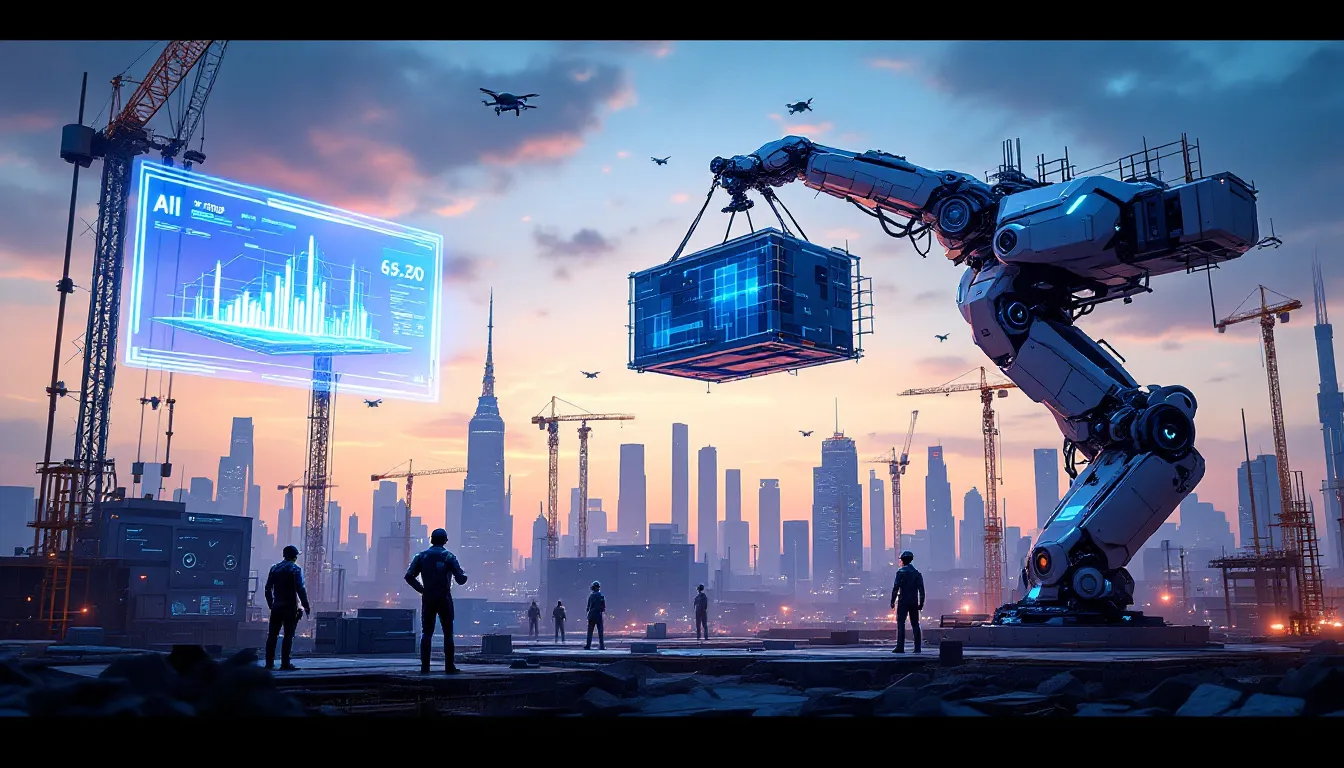AI in Construction: Top Trends and Practical Applications

The construction industry is undergoing a transformative shift with the integration of artificial intelligence (AI) and machine learning (ML). These technological advancements are instrumental in addressing the significant challenges associated with managing costs, adhering to project timelines, and enhancing on-site safety measures within construction projects. By adopting AI technology, construction companies have an opportunity to streamline their operations, mitigate expenses effectively, and elevate their performance standards.
As artificial intelligence continues its ascent in prominence across various industries—construction being no exception—the outlook for its future applications appears robustly optimistic. AI’s ability to analyze large volumes of data delivers powerful insights that aid informed decision-making processes crucial for constructing efficient building projects while enabling strategic foresight during planning stages.
Understanding AI in the Construction Industry
Key Components of AI Systems

In the construction industry, AI technology incorporates several fundamental elements like machine learning, deep learning, and artificial neural networks.
- Machine learning falls under the broader umbrella of AI and grants systems the capability to evolve from data analysis by recognizing patterns that enable predictions.
- Deep learning takes this one step farther by refining information processing for enhanced modeling and forecasting in various phases of construction tasks. Collectively, these innovative technologies are pivotal to automating and streamlining construction operations.
- Artificial neural networks are instrumental in analyzing large datasets and addressing complex problems with minimal human intervention. These networks support AI-powered tools used in construction functions, such as generative AI for design creation and computer vision for quality control practices.
Practical Applications of AI in Construction Management

AI tools are revolutionizing the management of construction projects by enhancing efficiency and productivity at every stage, from project planning and design to scheduling and resource allocation. The extensive use of AI in construction management underscores its importance throughout the entire lifecycle of a construction project.
The automation of repetitive tasks, optimization of workflows, and delivery of data-driven insights through AI make it an indispensable resource for construction companies aiming to maintain their edge in an increasingly digital era.
Project Planning and Design
The construction industry is experiencing a significant transformation with the adoption of AI-driven generative design in project planning and design. At the outset of a project’s conceptual phase, examining multiple strands of data such as financial metrics or environmental impact considerations is a game-changer. Leveraging past projects as learning material, AI refines building plans to be both efficient and cost-saving.
Utilizing AI-powered Building Information Modeling (BIM), professionals can create detailed 3D models that provide vivid visualizations, assist in decision-making, and allow early detection of potential issues, which ultimately leads to decreased costs while amplifying overall project excellence.
AI tools are fostering improved collaboration among various sub-teams by detecting possible interferences within their designs before any actual construction takes place. Enhanced real-time data exchange facilitated by these tools assures consistent information flow amongst all parties involved in the project. Compliance with building codes is verified through AI, which simplifies the commencement process for construction while ensuring strict adherence to guidelines.
Scheduling and Resource Allocation
By incorporating external factors into the scheduling process, AI substantially improves the reliability of project timelines for construction. This enables project managers to craft schedules that are both accurate and achievable by leveraging data analytics, which reduces delays and boosts the efficiency of projects. By examining historical performance data, AI uncovers hidden patterns and trends that contribute to more effective resource allocation while simultaneously cutting down on waste.
Construction companies benefit from enhanced efficiency and cost reductions when they improve their resource management with AI’s assistance. It pinpoints areas where resources can be used more effectively, ensuring optimal material and labor distribution for each task. This strategy not only leads to better adherence to project timelines but also plays a significant role in achieving overall success by reducing waste and elevating productivity levels.
Risk Mitigation and Safety
AI technology is revolutionizing safety and risk mitigation at construction sites. By scrutinizing images from job sites, AI-powered systems can detect unsafe conditions instantly, which enables rapid response to avert potential hazards.
AI-enabled wearables (like smart helmets, vests, and boots) can continuously monitor workers’ health metrics (e.g., heart rate, temperature, fatigue) and environmental conditions (e.g., gas exposure, temperature). These devices can alert workers and supervisors if there are signs of heat stress, exhaustion, or exposure to harmful substances, ensuring immediate corrective action.
Wearables can also detect sudden falls or accidents, triggering automatic alerts to emergency responders or site managers. This reduces response time and ensures injured workers receive timely assistance.
Construction companies are also leveraging advanced analytics to predict possible project setbacks by utilizing historical data. AI can track and predict risks by analyzing real-time data from project management software, such as task completion rates, vendor performance, and compliance with safety protocols. Machine learning models can identify early signs of issues that could escalate into major setbacks. If a setback occurs, AI can assist in root cause analysis by analyzing patterns in the data to determine the underlying causes of delays to help prevent similar setbacks in future projects.
Enhancing Efficiency with AI-Powered Tools

AI-powered project management tools can improve productivity and efficiency in the realm of construction projects. By automating repetitive tasks and refining workflows using AI, these tools address common mismanagement problems that frequently cause increased costs and delays in project timelines.
Construction companies stand to benefit from these advanced technologies as they help optimize processes, cut down on expenses, and elevate the quality of project results.
Automated Quality Control
AI is revolutionizing quality control by employing image recognition to automate the detection of defects. This not only quickens the inspection processes, but also amplifies their precision, mitigating human error and upholding rigorous standards.
At the heart of this transformation lies computer vision—a technology that equips machines with visual understanding similar to humans—playing a pivotal role in maintaining stringent quality on construction projects. By deploying AI-driven sensors and cameras, these tools are capable of continuous monitoring across building sites. Capturing imagery and then processing and analyzing it promptly can flag structural issues or inconsistencies when compared to the original blueprints.
Adoption of such technologies fosters more informed decision-making while simultaneously safeguarding adherence to established quality benchmarks.
Predictive Maintenance
Predictive maintenance algorithms extend the machinery lifecycle, improve safety, and prevent downtimes by predicting equipment failures before they occur. AI-driven predictive maintenance transforms reactive maintenance into a proactive approach, resulting in significant cost savings and operational benefits.
Machine learning algorithms monitor equipment health, analyze sensor data, and detect anomalies, allowing for timely maintenance actions. Forecasting equipment failures and scheduling maintenance proactively through AI can increase machine lifespan by 20-40% and significantly reduce maintenance costs.
The integration of IoT further enhances the efficiency of predictive maintenance, resulting in time and cost savings.
Autonomous Vehicles and Robotics
The integration of autonomous vehicles and robotics are improving the construction industry, as these machines undertake a variety of tasks that were once exclusively performed by human labor. Autonomous machines such as self-operating bulldozers can carry out excavation and site preparation with high precision according to detailed plans, thus boosting productivity on job sites. These AI-powered vehicles enhance efficiency while also lowering fuel use and emissions, aiding in the advancement toward more eco-friendly construction methods.
In tasks like bricklaying, robots equipped for heavy lifting are making their mark alongside collaborative robots—or “cobots”—which work in tandem with humans to elevate safety levels and improve work efficiency at construction projects.
AI in Real-Time Monitoring and Data Analysis

AI is instrumental in analyzing real-time monitoring and data collected from construction sites. It helps to track interactions between workers, machinery, and materials while gathering a wide array of information such as images, video footage, reports, and equipment performance metrics.
Such comprehensive data is then processed by AI systems to forecast the timeframe and budget required for construction projects. These predictions offer crucial intelligence that aids in the planning and execution phases of these projects.
Site Progress Tracking
Utilizing AI-powered robots, the capture of 3D imagery is employed to accurately gauge the advancement of construction activities. These images are meticulously verified by neural networks to confirm that the progression of construction work aligns with predetermined plans. This innovation enables engineers to closely monitor progress and quality control, oversee financial aspects, and maintain strict adherence to timelines, all contributing significantly to refined project management processes.
Project managers benefit from real-time updates on site advancements provided by these AI technologies, enabling them not only to make well-informed decisions but also swiftly tackle any arising challenges. By harnessing the power of artificial intelligence in managing their teams and resources efficiently, they can ensure projects remain on course toward successful completion within set deadlines.
Environmental Compliance and Sustainability
AI technologies leverage Earth Observation data to monitor environmental parameters closely, guaranteeing that construction projects comply with ecological standards. These AI systems are pivotal in enhancing energy efficiency within the realm of construction, leading to reduced carbon footprints and promoting sustainable methods for constructing buildings. By pinpointing areas where energy is wasted and refining processes through AI, it is possible to curtail unnecessary waste and elevate the sustainability quotient of these projects.
In overseeing environmental influences and validating adherence to set regulations, AI serves as an indispensable tool in championing environmentally conscious building initiatives. This vigilant management of environmental compliance ensures that construction projects align with mandated norms and aids in fostering a greener, more viable world.
Revolutionizing Construction: The Power of AI
Many construction executives are hungry for AI but find themselves paralyzed when it comes to thinking about where to start and how to make sense of tons of data found in disparate systems and spreadsheets.
Before diving it, it is essential to understand its potential impact and risks and develop the strategies necessary to incorporate it into your company’s operations. Hartman’s IT and industry experts are uniquely positioned to assist you on your AI journey. Contact us to learn more about our AI and data services. We will help you evaluate your organization’s current capabilities, identify areas where AI can make the most impact, and develop an AI roadmap and data strategy to help you reach the next level.


